外研版小学英语六年级英语毕业考试分类总复习
外研版三起六年级小学英语总复习
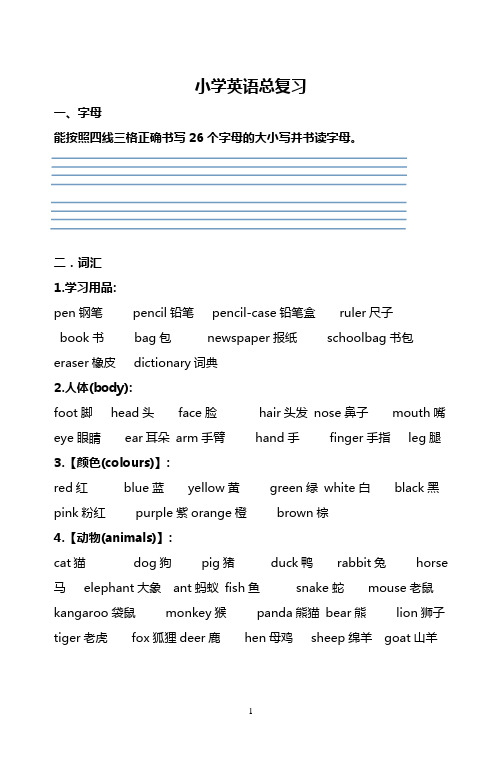
小学英语总复习一、字母能按照四线三格正确书写26个字母的大小写并书读字母。
二.词汇1.学习用品:pen钢笔pencil铅笔pencil-case铅笔盒ruler尺子book书bag包newspaper报纸schoolbag书包eraser橡皮dictionary词典2.人体(body):foot脚head头face脸hair头发nose鼻子mouth嘴eye眼睛ear耳朵arm手臂hand手finger手指leg腿3.【颜色(colours)】:red红blue蓝yellow黄green绿white白black黑pink粉红purple紫orange橙brown棕4.【动物(animals)】:cat猫dog狗pig猪duck鸭rabbit兔horse 马elephant大象ant蚂蚁fish鱼snake蛇mouse老鼠kangaroo袋鼠monkey猴panda熊猫bear熊lion狮子tiger老虎fox狐狸deer鹿hen母鸡sheep绵羊goat山羊1cow奶牛bird 鸟camel 骆驼frog青蛙cock公鸡dragon 龙owl 猫头鹰parrot鹦鹉5.【人物(people)】:friend朋友boy男孩girl女孩mother母亲father父亲sister姐妹brother兄弟uncle叔叔舅舅man男人woman女人Mr.先生Miss小姐lady女士;小姐mom妈妈dad爸爸parents父母grandparents祖父母grandma/grandmother(外)祖母grandpa/grandfather(外)祖父aunt姑姑cousin堂(表)兄弟;堂(表)姐妹son儿子daughter 女儿baby婴儿classmate同学people人物robot机器人6【职业(jobs)】:teacher教师student学生doctor医生nurse护士driver司机farmer农民singer歌唱家writer作家actor男演员actress女演员artist画家TV reporter电视台记者policeman(男)警察police警察7.【食品,饮料(food & drink)】:rice米饭bread面包beef牛肉milk牛奶water水egg蛋fish鱼tofu豆腐cake蛋糕hot dog热狗hamburger汉堡包biscuit饼干noodles面条meat肉chicken鸡肉vegetable蔬菜soup汤ice冰ice-cream冰淇淋cola可乐juice果汁breakfast早餐lunch午餐dinner/supper晚餐meal一餐cake蛋糕chocolate巧克力sandwich三明治cheese 奶酪sausage香肠dumpling 饺子tea 茶coffee咖啡8.水果,蔬菜(fruit & vegetables):apple苹果banana香蕉pear梨orange橙watermelon西瓜tomato西红柿potato土豆peach桃strawberry草莓carrot 胡萝卜cabbage卷心菜mango芒果9.【衣服(clothes)】:jacket夹克衫shirt衬衫T-shirt丅恤衫skirt短裙子dress连衣裙shoes鞋子sweater毛衣coat上衣raincoat雨衣shorts短裤hat(有沿的)帽子cap便帽sunglasses太阳镜trousers裤子cloth布10.【交通工具(vehicles)】:bike自行车bus公共汽车train火车boat小船ship轮船car 小汽车taxi出租车jeep吉普车plane/airplane飞机11.【事物(other things)】:thing东西window窗户door门desk课桌chair椅子bed床computer计算机light灯teacher's desk讲台picture图画;照片wall墙壁floor地板ball 球baseball 棒球basket ball篮球table tennis 乒乓球clock钟表card 卡片postcard明信片football/soccer足球present礼物lamp台灯phone电话sofa沙发shelf书架table桌子TV电视photo照片plate盘子knife刀fork叉chopsticks筷子gift礼物toy玩具doll洋娃娃ball球balloon气球kite 风筝jigsaw 拼图游戏box盒子umbrella伞violin小提琴piano钢琴trumpet小号yo-yo溜溜球hole洞toothbrush牙刷menu菜单e-card电子卡片e-mail电子邮件money钱12.【地点(locations)】:3home家room房间bedroom卧室living room起居室classroom教室school学校park公园library图书馆post office邮局police office警察局hospital医院cinema电影院bookstore书店farm农场zoo动物园garden花园study书房playground操场teacher's office教师办公室library图书馆washroom卫生间art room绘画教室computer room计算机教室music room音乐教室TV room电视机房factory工厂pet shop 宠物商店science museum科学博物馆the Great Wall长城supermarket超市bank银行country国家village乡村city城市hometown家乡bus stop公共汽车13.【气象(weather)】:cold寒冷的warm温暖的cool凉爽的snow下雪sunny晴朗的hot炎热的rain下雨windy有风的cloudy多云的weather report天气预报14.【Number 数字】One一two二three三four四five 五six六seven 七eight八nine九ten十eleven十一twelve十二thirteen十三fourteen十四fifteen十五sixteen十六seventeen十七eighteen十八nineteen 十九twenty 二十thirty三十forty四十fifty五十sixty六十seventy七十eighty 八十ninety九十hundred百thousand 一千million 百万15.week【周,星期,时间】weekday周日weekend周末Sunday星期日Monday 星期一Tuesday 星期二Wednesday 星期三Thursday 星期四Friday 星期五Saturday 星期六time 时间hour小时day 天today今天morning早上afternoon下午evening 晚上night夜间soon 不久often经常、时常usually通常sometimes有时never从不16.月份(Mouths):January 一月February 二月March 三月April 四月May 五月June 六月Juny 七月Augest 八月September 九月October 十月November 十一月December 十二月17.Sport (体育运动):football 足球basktball 篮球table tennis 乒乓球baseball 棒球ball 球skating 滑冰taiji 太极High jump 跳高long jump 跳远running 跑步walk 竞走wushu 武术swimming 游泳18.【季节(seasons)】:spring 春summer 夏autumn 秋winter 冬19.国家——国籍(countries)】:China---Chinese 中国————中国人(的);汉语America----American 美国——美国人(的)Australia——Australian 澳大利亚——澳大利亚人(的)Canada---Canadian 加拿大----加拿大人(的)England—English 英语---英语(的)Mexico----Mexican 墨西哥————墨西哥人(的)5France---French 法国——法语Japan---Japanese 日本------日本人(的)China/PRC中国America/USA 美国UK联合王国England英国Canada/CAN加拿大Australia澳大利亚New York纽约London伦敦Sydney悉尼20.【十七节日(festivals)】:New Year's Eve 除夕New Year 元旦Spring Festival 春节Lantern Festival 元宵节Dragon Boat Festival 端午节(龙舟节)the Mid-autumn Festival 中秋节Teathers' Day 教师节Christmas 圣诞节Thankgiving Day 感恩节Halloween 万圣节Flay Day 国旗日21.【动词及短语(verbs)】:look at 看着pass 传递get up 起床go to school 上学have lunch 吃午饭go home 回家watch TV 看电视go to bed 上床睡觉have breakfast 吃早饭have dinner 吃晚饭do 做play 玩,打(球)sleep 睡觉sing 唱歌give 给eat 吃fly 放(风筝)have got 拥有has got 拥有(have got的三单)go to work 上班Walk 步行swim 游泳live 居住go straight on 直着走turn left 向左转turn right 向右转write 书写take pictures 照相talk to 和、、、、、交谈play with 玩,摆弄listen to 听read 阅读let's=let us 让我们get on 上(车)get off 下(车)row 划(船)drink 喝,饮用want 需要,想要make 制作cook 烹饪,烧(菜)love 喜爱can 能够run 跑jump 跳ride 骑,乘Wash 洗,清洗draw 画visit 拜访,看望Come on 快点,赶快turn on 打开come in 请进count 数数take 带走,拿走help 帮助learn 学习hope 希望study 学习find 找到bring 带来use 使用stay 停留suggest 建议borrow 借arrive 到达climb 攀登,爬finish 吃完hurry 赶紧,匆忙hurry up 快点wait 等待drop 落下,掉下meet 遇见need 需要understand 明白,理解argue 争吵wear 穿control 控制catch 接住,抓住hear 听到sit 坐sit down 坐下skip 跳(绳)ring 鸣,响feel 感觉到miss 想念tell 告诉lost 丢失smell 闻到cross 穿过should 应该hold 抓住say 说话,讲话collect 收集sound 听起来speak 说,讲(语言)believe 相信copy 模仿clean 清理show 展示,出示become 成为shine 照耀fly away 飘走spend 度过be pround of 以。
外研版六年级英语下册各模块复习重点
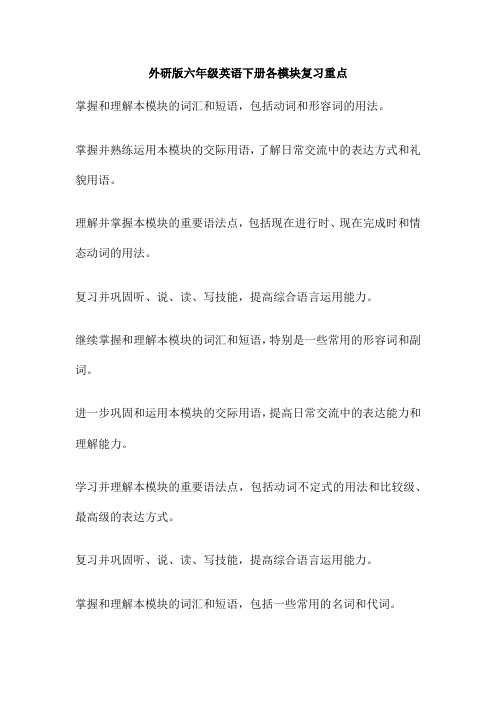
外研版六年级英语下册各模块复习重点掌握和理解本模块的词汇和短语,包括动词和形容词的用法。
掌握并熟练运用本模块的交际用语,了解日常交流中的表达方式和礼貌用语。
理解并掌握本模块的重要语法点,包括现在进行时、现在完成时和情态动词的用法。
复习并巩固听、说、读、写技能,提高综合语言运用能力。
继续掌握和理解本模块的词汇和短语,特别是一些常用的形容词和副词。
进一步巩固和运用本模块的交际用语,提高日常交流中的表达能力和理解能力。
学习并理解本模块的重要语法点,包括动词不定式的用法和比较级、最高级的表达方式。
复习并巩固听、说、读、写技能,提高综合语言运用能力。
掌握和理解本模块的词汇和短语,包括一些常用的名词和代词。
学习和掌握本模块的交际用语,了解不同场景下的表达方式和应对策略。
学习并理解本模块的重要语法点,包括名词复数形式和一般将来时的用法。
复习并巩固听、说、读、写技能,提高综合语言运用能力。
继续掌握和理解本模块的词汇和短语,包括一些常用的动词和形容词。
巩固和运用本模块的交际用语,提高日常交流中的表达能力和应对能力。
学习并理解本模块的重要语法点,包括一般现在时和特殊疑问句的用法。
复习并巩固听、说、读、写技能,提高综合语言运用能力。
掌握和理解本模块的词汇和短语,包括一些常用的动词短语和介词短语。
巩固和运用本模块的交际用语,提高日常交流中的表达能力和应对能力。
学习并理解本模块的重要语法点,包括现在完成时的用法和情态动词的用法。
随着课程的深入,我们已经来到了小学英语的最后阶段。
在这个关键时期,一份精心设计的总复习课件对于学生们掌握和巩固所学知识,以及准备接下来的升学考试至关重要。
今天,我们将一起探讨如何制作一份有效的“外研版英语六年级下册总复习课件”。
在制作课件之前,我们需要明确课件的目标。
对于总复习课件,目标应该包括:通过各种活动和练习,加深学生对英语的理解和运用;词汇复习:将本学期的重点词汇进行整理,并配以图片和例句,方便学生记忆。
小学英语外研版(三起)六年级下册新标准毕业班复习测试题全集最新版动词专项练习

小学英语外研版(三起)六年级下册小学英语毕业升学分类专练(动词)Ⅰ.选择填空()1.There a tall tree and some flowers near my house.A. isB. areC. haveD.has()2.There any tables in my bedroom.A.areB.isC.aren'tD.isn't()3.Do you like football?A. playB.playingC. playsD.played()4.--When your father usually go to bed?--He usually to bed at 11:00.A. did ,goB.does ,goesC.do ,goD.do , goes()5. !This is a photo of my sister.A. LooksB. Look atC. SeeD.Look()6.He TV for two hours every evening.A. watchB.watchesC. watchedD.is watching()7.--Where he from?--He from China.A.is ,comeB.is ,comesC.does,isD. does,comes ()8.--Where is my pencil? --I can't it.A. look atB. findC. look forD. found()9.--What is he doing? --He is a book.A. readB.readsC.read toD. reading()10.I often go school.A. am walkingB. walkingC.walkD. walks ()11.--What you do yesterday?--I my friends.A. do , visitB.was ,visitedC.did ,visitedD.does,visit ()12.I the pictures now.A. drawB.drawsC.am drawingD.drawing()13.What would you like ?A. drinkB.to drinkC.drinkingD.drinks()14.May I you ?A.to helpB.helpingC.helpD.helps()15.He many books.A. isB. hasC. haveD.are()16.The jeans on the desk.A. isB. areC. hasD.have()17.Here some sweaters for you.A. isB. haveC.hasD.are()18.We TV on Monday.A. don't watchB.doesn't watchC.watchesD.are watching ()19.Mary her grandparents tomorrow.A. visitB.visitedC.will visitD. visits()20.She happy yesterday.A. wasB.isC. areD. wereⅡ.用下列动词的适当形式填空1.The girl (be ) Jack's sister.2.Mike and Liu Tao (be)at school.3.She (be)happy yesterday.4.He often (have )dinner at home.5.They (have )the same hobby.6.We (have)a big party yesterday.7. they (like)the World Cup(世界杯)?8.Look!the girls (dance) in the classroom.9.My mother (cook)some nice food now.10.Mary (visit)her grandparents tomorrow.11.--How (do)he go to school?--He (go )to school by bus.12.I (watch)TV every day.13.My aunt (look)after her baby carefully every day.14.Would you like (write)to me soon?15.I (go )to school at seven yesterday.16.How can I (get )there?17.It's very cold.You'd better not (take off)your coat.18.I like (make)robots.19.She (study)English very well.20.Let's go (swim).21.I want to (visit)him one day.22.It often (rain)in summer.23.Look!The bus (come).24.Miss Li (teach)you English next term.Ⅲ.按要求完成下列各题1.写出下列动词的第三人称单数形式drink go stay make look have pass carry come watch plant fly study brush teach do catch buy give say play run like speak read swim sing see2.写出下列动词的现在分词play run swim makego listen write skiread have sing danceput watch buy givelive take come getstop sit begin flyhelp stand do closework read wash wait 3.写出下列动词的过去式形式is/am are drink playgo make does danceworry ask eat drawput kick pass dovisit get buy sendopen write tell see。
外研版小学六年级上学期英语期末整理复习课后练习单
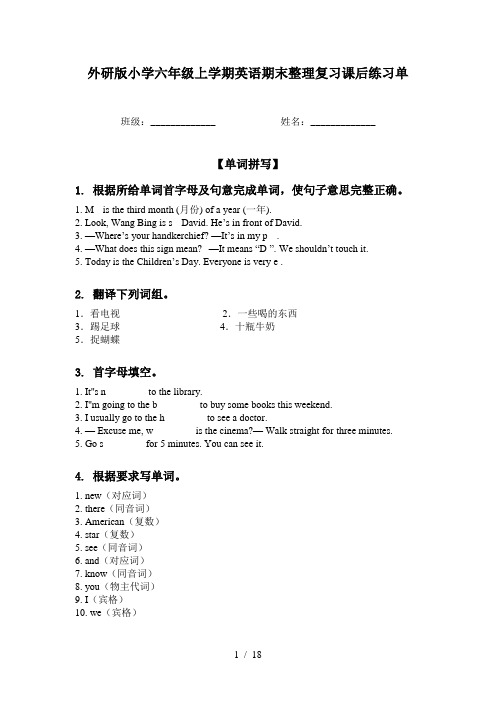
外研版小学六年级上学期英语期末整理复习课后练习单班级:_____________ 姓名:_____________【单词拼写】1. 根据所给单词首字母及句意完成单词,使句子意思完整正确。
1. M is the third month (月份) of a year (一年).2. Look, Wang Bing is s David. He’s in front of David.3. —Where’s your handkerchief? —It’s in my p .4. —What does this sign mean? —It means “D ”. We shouldn’t touch it.5. Today is the Children’s Day. Everyone is very e .2. 翻译下列词组。
1.看电视_________________ 2.一些喝的东西_________________ 3.踢足球_________________ 4.十瓶牛奶_________________5.捉蝴蝶_________________3. 首字母填空。
1. It''s n________ to the library.2. I''m going to the b________ to buy some books this weekend.3. I usually go to the h________ to see a doctor.4. — Excuse me, w________ is the cinema?— Walk straight for three minutes.5. Go s________ for 5 minutes. You can see it.4. 根据要求写单词。
1. new(对应词)____________________2. there(同音词)_____________________3. American(复数)_________________4. star(复数)________________________5. see(同音词)_____________________6. and(对应词)______________________7. know(同音词)___________________8. you(物主代词)____________________9. I(宾格)_________________________10. we(宾格)________________________5. 按要求写出单词。
外研版六年级上学期英语期末整理复习真题

外研版六年级上学期英语期末整理复习真题班级:_____________ 姓名:_____________【单词拼写】1. 单词拼写。
1. 菜单 _______________2. 美味的 _______________3. 甜的 _______________4. 任何的 _______________5. 问题 _______________6. 色拉 _______________2. 根据图片补全短语。
[1] go ________ [2] see a ________ [3] go to the ________ [4] go for a ________ [5] make a ________3. 根据句意及首字母或汉语提示完成句子。
1. I want to tell you a _________ (真的) story.2. A car crashed into the bridge and fell into the river. The police are checking what ________(引起) the disaster.3. The animals ran in all _______ (方向) when they heard the big noise.4. White snow ________(覆盖)the land and everything looks white and clean.5. His car _________ (猛撞) into a tree, so he called 120 for help.6. In 1976, a terrible e__________ happened in Tangshan in China.7. Many people had to leave their homes because of the f_________.8. T________ always comes after lighting.9. Taking a short rest at noon is good for your body and m_________.10. Listen! We can hear the strong wind b________ outside.4. 补全本课出现的单词。
外研版(三起)六年级英语上册期末知识整理汇总复习(全册)
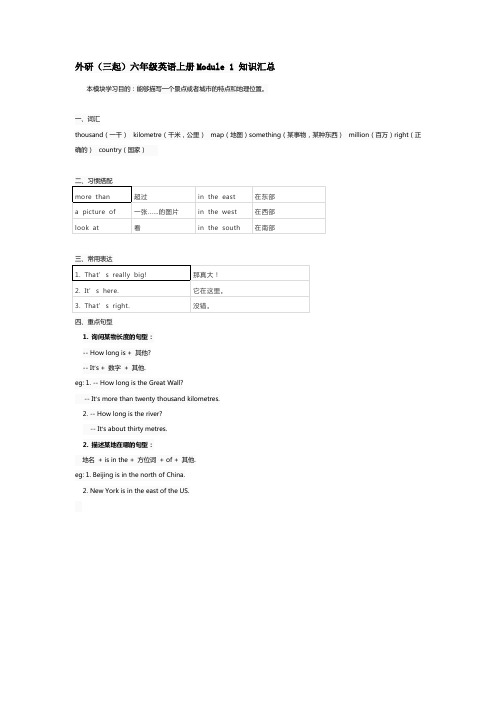
本模块学习目的:能够描写一个景点或者城市的特点和地理位置。
一、词汇thousand(一千) kilometre(千米,公里) map(地图)something(某事物,某种东西) million(百万)right(正确的) country(国家)四、重点句型1. 询问某物长度的句型:-- How long is + 其他?-- It’s + 数字+ 其他.eg: 1. -- How long is the Great Wall?-- It’s more than twenty thousand kilometres.2. -- How long is the river?-- It’s about thirty metres.2. 描述某地在哪的句型:地名+ is in the + 方位词+ of + 其他.eg: 1. Beijing is in the north of China.2. New York is in the east of the US.一、词汇Dancing(跳舞,舞蹈) Chinatown(唐人街,中国城)sometimes(有时) shop(商店) then(既然是这样,那么)ah(啊) strong(坚固的)专有名词:the Changjiang River(长江)the Huangshan Mountain(黄山)the West Lake(西湖)the Great Wall(长城)三、知识点tell sb about sth (告诉某人关于某事)四、重点句型there be 句型(be动词选择采用就近一致原则)eg: There is a cat and lots of big apples on the tree.There are many birds and a kite in the sky.一、词汇1. collect 收集2. stamp 邮票3. hobby业余爱好4. doll 玩具娃娃5. bicycle自行车三、惯用表达1. That’s right! 没错!2. Great! 太好了!3. What about you? 你呢?四、重点句型1. 主语+ is my hobby.eg: Collecting stamps is my hobby.2. 主语(不是第三人称单数)+ have got + 其他. eg: They have got famous people on them.3. –What’s your hobby? –主语+ is my hobby. eg: –What’s your hobby? –Flying kites is my hobby.一、词汇1. Thanksgiving (Thanksgiving Day)感恩节2. flag 旗;国旗3. fly(使)(旗帜)飘扬4. special特殊的,特别的5. meal 餐6. sound 听起来7. football (美式)橄榄球8. race 比赛,竞赛9. lantern 灯笼10. hang 悬挂,吊二、习惯搭配1. Flag Day (美国)国旗制定纪念日2. moon cake 月饼3. the Mid–Autumn Festival 中秋节4. the Dragon Boat Festival 端午节5. the Lantern Festival元宵节6. sing songs 唱歌7. a special meal 一顿特别的饭8. do dragon dances 舞龙9. hang lanterns 挂灯笼10. on TV在电视上11. fly the flag 升(国)旗12. my favourite festival 我最喜欢的节目13. go to see the dragon boat race 去看龙舟比赛14. a big family dinner 一顿丰盛的家庭晚餐三、惯用表达1. That’s lovely. 那太好了。
(外研版)小学六年级英语毕业考试:总复习全套资料

外研版小学英语小升初总复习一、字母能按照四线三格正确书写26个字母的大小写并书读字母。
二.词汇1.学习用品:pen钢笔pencil铅笔pencil-case铅笔盒ruler尺子book书bag包newspaper报纸schoolbag书包eraser橡皮dictionary词典2.人体(body):foot脚head头face脸hair头发nose鼻子mouth嘴eye眼睛ear耳朵arm手臂hand手finger 手指leg腿3.【颜色(colours)】:red红blue蓝yellow黄green绿white白black黑pink粉红purple紫orange橙brown棕4.【动物(animals)】:cat猫dog狗pig猪duck鸭rabbit兔horse马elephant大象ant蚂蚁fish鱼snake蛇mouse 老鼠kangaroo袋鼠monkey猴panda熊猫bear熊lion狮子tiger老虎fox狐狸deer鹿hen母鸡sheep绵羊goat山羊cow奶牛bird 鸟camel 骆驼frog青蛙cock公鸡dragon龙owl 猫头鹰parrot鹦鹉5.【人物(people)】:friend朋友boy男孩girl女孩mother母亲father父亲sister姐妹brother兄弟uncle叔叔舅舅man男人woman女人Mr.先生Miss小姐lady女士;小姐mom妈妈dad 爸爸parents父母grandparents祖父母grandma/grandmother(外)祖母grandpa/grandfather(外)祖父aunt姑姑cousin堂(表)兄弟;堂(表)姐妹son儿子daughter女儿baby婴儿classmate同学people人物robot机器人6【职业(jobs)】:teacher教师student学生doctor医生nurse护士driver司机farmer农民singer歌唱家writer 作家actor男演员actress女演员artist画家TV reporter电视台记者policeman(男)警察police警察7.【食品,饮料(food & drink)】:rice米饭bread面包beef牛肉milk牛奶water水egg蛋fish鱼tofu豆腐cake蛋糕hot dog 热狗hamburger汉堡包biscuit饼干noodles面条meat肉chicken鸡肉vegetable蔬菜soup汤ice冰ice-cream冰淇淋cola可乐juice果汁breakfast早餐lunch午餐dinner/supper晚餐meal 一餐cake蛋糕chocolate巧克力sandwich三明治cheese 奶酪sausage香肠dumpling 饺子tea 茶coffee咖啡8.水果,蔬菜(fruit & vegetables):apple苹果banana香蕉pear梨orange橙watermelon西瓜tomato西红柿potato土豆peach 桃strawberry草莓carrot胡萝卜cabbage卷心菜mango芒果9.【衣服(clothes)】:jacket夹克衫shirt衬衫T-shirt丅恤衫skirt短裙子dress连衣裙shoes鞋子sweater 毛衣coat上衣raincoat雨衣shorts短裤hat(有沿的)帽子cap便帽sunglasses太阳镜trousers裤子cloth布10.【交通工具(vehicles)】:bike自行车bus公共汽车train火车boat小船ship轮船car小汽车taxi出租车jeep吉普车plane/airplane飞机11.【事物(other things)】:thing东西window窗户door门desk课桌chair椅子bed床computer计算机light灯teacher's desk讲台picture图画;照片wall墙壁floor地板ball 球baseball 棒球basket ball篮球table tennis乒乓球clock钟表card 卡片postcard明信片football/soccer足球present礼物lamp台灯phone电话sofa沙发shelf书架table 桌子TV电视photo照片plate盘子knife刀fork叉chopsticks筷子gift礼物toy玩具doll洋娃娃ball 球balloon气球kite风筝jigsaw 拼图游戏box盒子umbrella伞violin小提琴piano钢琴trumpet小号yo-yo溜溜球hole洞toothbrush牙刷menu菜单e-card电子卡片e-mail电子邮件money钱12.【地点(locations)】:home家room房间bedroom卧室living room起居室classroom教室school学校park公园library图书馆post office邮局police office警察局hospital医院cinema电影院bookstore书店farm农场zoo动物园garden花园study书房playground操场teacher's office教师办公室library图书馆washroom卫生间art room绘画教室computer room计算机教室music room音乐教室TV room电视机房factory工厂pet shop 宠物商店science museum科学博物馆the Great Wall长城supermarket超市bank银行country国家village 乡村city城市hometown家乡bus stop公共汽车13.【气象(weather)】:cold寒冷的warm温暖的cool凉爽的snow下雪sunny晴朗的hot炎热的rain下雨windy有风的cloudy多云的weather report天气预报14.【Number 数字】One一two二three三four四five 五six六seven 七eight八nine九ten十eleven 十一twelve十二thirteen十三fourteen十四fifteen十五sixteen十六seventeen十七eighteen十八nineteen 十九twenty 二十thirty三十forty四十fifty五十sixty六十seventy七十eighty 八十ninety九十hundred百thousand 一千million 百万15.week【周,星期,时间】weekday周日weekend周末Sunday星期日Monday 星期一Tuesday星期二Wednesday 星期三Thursday 星期四Friday 星期五Saturday 星期六time 时间hour小时day 天today今天morning早上afternoon下午evening 晚上night夜间soon 不久often经常、时常usually通常sometimes有时never从不16.月份(Mouths):January 一月February 二月March 三月April 四月May 五月June 六月July 七月August 八月September 九月October 十月November 十一月December 十二月17.Sport (体育运动):football 足球basketball 篮球table tennis 乒乓球baseball 棒球ball 球skating 滑冰taiji 太极High jump 跳高long jump 跳远running 跑步walk 竞走wushu武术swimming 游泳【季节(seasons)】:spring 春summer 夏autumn 秋winter 冬18.国家——国籍(countries)】:China---Chinese 中国————中国人(的);汉语America----American 美国——美国人(的)England—English 英语---英语(的)Australia——Australian 澳大利亚——澳大利亚人(的)Canada---Canadian 加拿大----加拿大人(的)Japan---Japanese 日本------日本人(的)Mexico----Mexican 墨西哥————墨西哥人(的)France---French 法国——法语China/PRC中国America/USA美国UK联合王国England英国Canada/CAN加拿大Australia澳大利亚New York纽约London伦敦Sydney悉尼19.【十七节日(festivals)】:New Year's Eve 除夕New Year 元旦Spring Festival 春节Lantern Festival 元宵节Dragon Boat Festival 端午节(龙舟节)the Mid-autumn Festival 中秋节Teathers' Day 教师节Christmas 圣诞节Thanksgiving Day 感恩节Halloween 万圣节Flay Day 国旗日20.【动词及短语(verbs)】:look at 看着pass 传递get up 起床go to school 上学have lunch 吃午饭go home 回家watchTV 看电视go to bed 上床睡觉have breakfast 吃早饭have dinner 吃晚饭do 做play 玩,打(球)sleep 睡觉sing 唱歌give 给eat 吃fly 放(风筝)have got 拥有has got 拥有(have got的三单)go to work 上班Walk 步行swim 游泳live 居住go straight on 直着走turn left 向左转turn right 向右转write 书写take pictures 照相talk to 和、、、、、交谈play with 玩,摆弄listen to 听read 阅读let's=let us 让我们get on 上(车)get off 下(车)row 划(船)drink 喝,饮用want 需要,想要make 制作cook 烹饪,烧(菜)love 喜爱can 能够run 跑jump 跳ride 骑,乘Wash 洗,清洗draw 画visit 拜访,看望Come on 快点,赶快turn on 打开come in 请进count 数数take 带走,拿走help 帮助learn 学习hope 希望study 学习find 找到bring 带来use 使用stay 停留suggest 建议borrow 借arrive 到达climb 攀登,爬finish 吃完hurry 赶紧,匆忙hurry up 快点wait 等待drop 落下,掉下meet 遇见need 需要understand 明白,理解argue 争吵wear 穿control 控制catch 接住,抓住hear 听到sit 坐sit down 坐下skip 跳(绳)ring 鸣,响feel 感觉到miss 想念tell 告诉lost 丢失smell 闻到cross 穿过should 应该hold 抓住say 说话,讲话collect 收集sound 听起来speak 说,讲(语言)believe 相信copy 模仿clean 清理show 展示,出示become 成为shine 照耀fly away 飘走spend 度过be proud of 以。
外研版)小学六年级英语毕业考试:总复习全套资料

外研版)小学六年级英语毕业考试:总复习全套资料1.研究用品:在研究中,我们需要用到许多研究用品,例如钢笔(pen)、铅笔(pencil)、铅笔盒(pencil-case)、尺子(ruler)、书(book)、包(bag)、报纸(newspaper)、书包(schoolbag)、橡皮(eraser)和词典(nary)等。
2.人体:身体是我们最重要的财富,我们需要了解身体的各个部位,例如脚(foot)、头(head)、脸(face)、头发(hair)、鼻子(nose)、嘴(mouth)、眼睛(eye)、耳朵(ear)、手臂(arm)、手(hand)、手指(finger)和腿(leg)等。
3.颜色:颜色是我们生活中不可或缺的一部分,常见的颜色有红色(red)、蓝色(blue)、黄色(yellow)、绿色(green)、白色(white)、黑色(black)、粉红色(pink)、紫色(purple)和橙色(orange)等。
4.动物:动物是我们生活中的朋友,我们需要了解各种动物的名称,例如猫(cat)、狗(dog)、猪(pig)、鸭(duck)、兔子(rabbit)、马(horse)、大象(elephant)、蚂蚁(ant)、鱼(fish)、蛇(snake)、老鼠(mouse)、袋鼠(kangaroo)、猴子(monkey)、熊猫(panda)、狮子(n)、老虎(tiger)、狐狸(fox)、鹿(deer)、母鸡(hen)、绵羊(sheep)、山羊(goat)、奶牛(cow)、鸟(bird)、骆驼(camel)、青蛙(frog)、猫头鹰(owl)和鹦鹉(parrot)等。
5.人物:在生活中,我们会遇到各种人物,例如朋友(friend)、男孩(boy)、女孩(girl)、母亲(XXX)、父亲(father)、姐妹(sister)、兄弟(brother)、叔叔(uncle)、舅舅(uncle)、男人(man)、女人(woman)、先生(Mr.)、小姐(Miss)、女士(lady)、妈妈(mom)、爸爸(dad)、父母(parents)、祖父母(grandparents)、祖母(grandma/grandmother)、祖父(grandpa/grandfather)、姑姑(aunt)、堂(表)兄弟(cousin)、堂(表)姐妹、儿子(son)、女儿(daughter)、婴儿(baby)、同学(classmate)、人物(people)和机器人(robot)等。
外研版小学六年级下册英语总复习
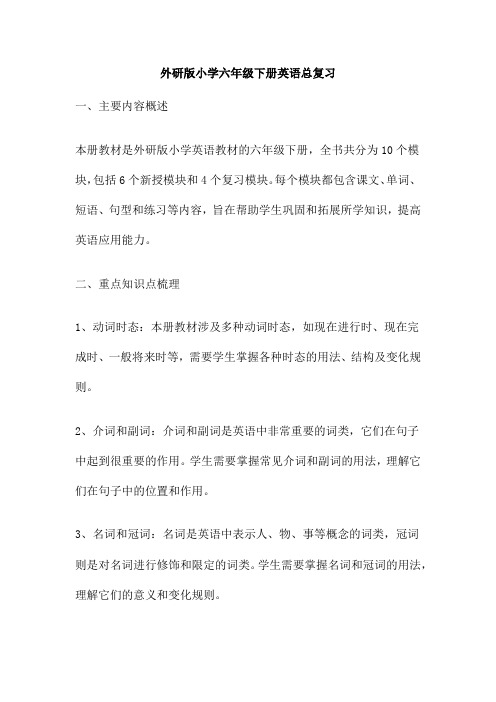
外研版小学六年级下册英语总复习一、主要内容概述本册教材是外研版小学英语教材的六年级下册,全书共分为10个模块,包括6个新授模块和4个复习模块。
每个模块都包含课文、单词、短语、句型和练习等内容,旨在帮助学生巩固和拓展所学知识,提高英语应用能力。
二、重点知识点梳理1、动词时态:本册教材涉及多种动词时态,如现在进行时、现在完成时、一般将来时等,需要学生掌握各种时态的用法、结构及变化规则。
2、介词和副词:介词和副词是英语中非常重要的词类,它们在句子中起到很重要的作用。
学生需要掌握常见介词和副词的用法,理解它们在句子中的位置和作用。
3、名词和冠词:名词是英语中表示人、物、事等概念的词类,冠词则是对名词进行修饰和限定的词类。
学生需要掌握名词和冠词的用法,理解它们的意义和变化规则。
4、句子结构:英语句子结构可以分为简单句、并列句和复合句等,学生需要掌握各种句子结构的构成和用法,理解它们在表达意思时的不同作用。
5、阅读理解:阅读理解是英语学习中非常重要的一项技能,学生需要提高阅读速度和理解能力,掌握阅读技巧和方法。
三、复习策略和建议1、系统复习:制定合理的复习计划,按照教材顺序进行系统复习。
注意把握重点和难点内容的复习时间和力度。
2、强化记忆:多读、多背、多记是提高英语成绩的有效途径。
学生可以通过朗读、背诵、记忆等方式加强记忆,提高词汇量和语法知识水平。
3、注重实践:英语是一门实践性很强的学科,学生需要多听、多说、多写。
通过模拟对话、写作练习等方式提高英语应用能力。
4、练习册:认真完成教材配套的练习册中的练习题,及时查漏补缺,巩固所学知识。
5、课外阅读:适当阅读课外英语读物,如英语故事书、英文报纸等,可以提高阅读兴趣和扩大词汇量。
6、做好笔记:在复习过程中做好笔记,记录重点内容、典型例题和自己的错题集锦,方便以后查阅和复习。
7、交流讨论:与同学、老师或家人交流讨论学习内容和方法,互相借鉴经验,提高学习效果。
四、模拟试题及答案解析(此处略去模拟试题及答案解析)五、结语小学六年级下册英语总复习是帮助学生巩固和拓展所学知识,提高英语应用能力的重要阶段。
外研版六年级下册毕业复习重点知识点精编版

外研版六年级下册毕业复习重点知识点GE GROUP system office room 【GEIHUA16H-GEIHUA GEIHUA8Q8-重点短语和句子1.a hot dog一个热狗2.A cola for me一杯给我的可乐3.three colas三杯可乐4.How much多少钱5.Here you are. 给你6.Enjoy your meal!享受你的美餐7.Let me take them.让我拿他们.8.Be careful! 小心9.lots and lots of cheese 许多许多奶酪10.have a seat就座.11.favourite dish最喜爱的菜1.have breakfast吃早饭2.have lunch吃午饭3. have a picnic吃野餐4.at half past twelve在十二点半5. what time几点/什么时间?6.over there 在那边7.look like看起来像?8. a beautiful day一个好天9.in the sky在空中10.to go 剩余11.after dinner晚饭后12.play chess下棋13.let’s=let us 让我们一起1.have a veryinteresting day 度过非常有趣的一天.2.on Saturday在星期六3.send some photos 发送一些照片4.write to……给……写信5.in this photo在这张照片里6.in the tree在树上7.under the tree在树下8.look hungry看起来饿了9.fly away 飞走10.in the mountains 在山里11.drink water喝水12.play hide-and-seek 玩捉迷藏13.look out of....向....外面看14.on the train在火车上15.wear a big hat戴一顶大帽子e to the station来到车站17.the middle of thenight午夜,18. the middle of...在...的中心19.have a lovely time玩得愉快1.at the supermarket在超市2.buy…for…给…买…3.have a birthdayparty举行生日聚会4.talk on the phone打电话/在电话说话5.pick up捡起/拾起6.clean the stairs扫楼梯7.wash the apples洗苹果8.try to do sth.尽量做某事9.get on the bus上公交车10. get off the bus下车11. drive the bus驾车,12.What a mess太糟糕1.play the suona吹唢呐e in进来3.the third time 第三次4.cross the street穿过街道5.eat dinner吃晚餐6. talk to.....和...说话7.do exercises做操8.start to rain/snow 开始下雨 /雪9.walk in the park在公园走10.ride his bike骑她的自行车11.wave to say goodbye挥手说再见12.high up在...上面13.call out 叫喊14.have an ice cream吃冰激凌15.wake up醒来16.wake up from mydream从梦中惊醒1.welcome home 回家2.be interestedin……对……感兴趣3.on the earth 在地球上4.bring back 带回?5.into space 进入太空6.national flag国旗?7.the first time首次?8.a model of 一个……的模型?9.a model of aChinese spaceship 一个中国的太空飞船的模型10.decide to(do)…… 觉得做……1.a long time ago很久以前2.a lot of work 大量的工作3.fly to the earth 飞向地球4.make a video 录像e back 回来6.go to the airport去机场7.be proud of 为…感到自豪8.be born in 出生于9.live to be 活到10.role model 模范11.all over the word 世界各地12.teach sb.to do sth.教某人做某事13.teach her to spell教她拼写e into进入……里面2.bring…for…为…带…3.put…on…把…放在…上4.be easy to do很容易做……5.make mistakes犯错误6.with English words在英语单词方面7.plan to do计划做…8.a baseball game 一场棒球比赛9.wear a raincoat穿雨衣10.go to the theatre去剧院11.play hide-and-seek捉迷藏12.be a star成为明星13.look at the sky看天空14.look down at me向下看我1.best wishes最美好的祝愿2.say goodbye to跟……道别3.primary school 小学4.write a message写一条留言5.enjoy one’s time 享受某人的时光6.good luck for 祝……好运7.have a happy time 度过快乐的时光8.watch football games看足球比赛9.a good idea 一个好主意10.in every letter 在每一封信中11.write goodbyeletters给……写道别信1.a goodbye speech一次告别演出2.middle school中学3.this September今年九月4.at the same time 同时5.go back返回e back7.keep on(doing)保持(做…),8.keep on practicingChinese 保持练习汉语9.each other 互相10.be friends 成为朋友11.say goodbye to跟…说再见12.write emails写邮件13.study geography学习地理14.It's time to do…到做…的时候常用动词过去式am/is -was are-weredo--did go -went get- gotbuy--bought? bring--broughtgive--gave see--sawlearn-learnt put--putread-read make--made?take--took hang--hung?fly-flew? spend --spent?come --came? have-had become--became draw -drewteach-taught write--wrotetell--toldsay--said can--couldmeet--met travel--travelledplan-planned ask-asked show-showedfinish--finishedthank--thanked?laugh --laughedopen-opened shout-shouted?play--played watch--watcheddecide-decided?live--lived?smile—smiledbreak- brokecatch -caughtdrink-drankeat -ate feel -felt find- foundkeep -kept leave -left let-let ride -rodering -rang run -ransend -sent sing -sangsit -sat sleep -sleptspeak- spoke swim -swamthink -thought will -would win -won常用介词(有阴影的重点记忆)1)after(在……之后):after breakfast 早饭后,after school 放学后,2)before(在……之前):before class 课前,before lunch 午饭前3)at(在):at home在家,at school 在学校,at work 在工作。
外研社六年级英语毕业考试知识点整理1教学提纲

外研社六年级英语毕业考试知识点整理1外研社六年级英语毕业考试知识点整理一、各分册重要知识点外研版第1册主要内容词汇:boy girl door window blackboard bird desk chair red blue yellow green black dog cat cap panda one two three four five six seven eight nine ten eleven twelve school teacher bag pencil pen book cake kite mother father grandpa grandma sister brother doctor driver policeman nurse farmer head arm leg foot nose eye mouth ear句子:----Good morning! ----Good morning!----Good afternoon! ----Good afternoon!----How are you?----I’m fine, thank you.----What’s your name?----I’m ….----Point to the door/window/blackboard…..----Stand up/ Sit down, please.----What colour?----It’s red/blue….----How many? ----One/Two/Three….----What’s this/that? ----It’s a chair/desk…----Happy birthday! ----Thank you.---- Here’s your present/cake. ----Thank you.----How old are you? ----I’m nine.----Is it a cat? ----Yes, it is./ No, it isn’t.----Where’s the cat? ---I don’t know./ It’s in the green bag.---- This is my father.----He/She’s a doctor/nurse…. \---- This is his/ her arm/head….外研版第2册主要内容词汇:song toy car ship doll animal monkey tiger lion elephant big small fat thin tall short sport football basketball table tennis riding bikes swimming skipping meat rice noodles fish milk banana pear orange apple Chinese Maths Science Music Art PE play sleep sing give eat Christmas spring summer autumn winter hot warm cool cold sunny windy dress coat sweater T-shirt bike bus walk in on under park词组:get up go to school have lunch go home watch TV go to bed have breakfast have dinner Spring Festival New Year fly kites go to work by bus by bike go fishing句子:My favourite toy is a car/ doll….----What’s this/that? ----It’s a tiger.----What are they? ------ They’re lions.I like/ don’t like football/ basketball….I like/ don’t like swimming/skipping….----Do you like meat? ----Yes, I do./ No, I don/t.----Does Daming/he/ she like bananas? -----Yes, he does./ No, she doesn’t.I get up at seven o’clock.----What’s the time, please? ---- It’s half past seven.----What do you do at the weekend? ----- I play football.----What does he/she do at the weekend? ---- He/ She watches TV.Happy New Year.It’s spring/ summer/ autumn/ winter.It’s warm/hot/cool/cold in spring/summer/ autumn/ winter.I’ve got a new book.----Have you got a new book?--- Yes, I have. / No, I haven’t.----Has Tom/he/she got a new book? ----Yes, he/she has. / No, he/she hasn’t.Amy/ He/ She goes to school by bike/ by bus/by car.I t’s in/ on/ under the desk….外研版第3-4册主要内容(一)、情境问答:第三册1. Have you got_______? Yes, I have. No, I haven’t.2. Excuse me. Where’s the________, please?Go straight on. Turn right. Turn left.3. What are you doing? I’m _______What is he/she doing? He’s/She’s ___________What are they doing? They’re __________4. Do you want some _______? Yes, please. No, thank you.5. Can you _____ ? Yes, I can. No, I can’t.6. What are you going to do? I’m/We’re going to _______7. Can I have some ______ ? Yes, you can. Sorry, you can’t.8. How many ____ are there in ____? There is/are______第四册9. Is it _____? Yes, it is. No, it isn’t.10. Will you _____ ? Yes, I will. No, I won’t.11. Was he/she/it _____? Yes, he/she/it was. No, he/she/it isn’t.Were you ______? Yes, I was. No, I wasn’t.12. Did you/he/she/they____? Yes, I/he/she/they did. No, I/he/she/they didn’t. (二)、词组短语第三册take pictures watch TV read a bookwrite a letter listen to music talk to my friendplay with in the park look atrow a boat under the tree play chessplay football play basketball play table tennismake a cake do the high jump do the long jump第四册have a picnic go swimming go to the parkdo homework speak English情景运用:第三册1. 问路、指路Excuse me. Where’s the _______, please?Go straight on. / Turn left. / Turn right.2.询问对方正在做什么What are you doing? I’m _______What is he/she doing? He’s/She’s ___________What are they doing? They’re __________3. 询问对方是否要吃某种食物Do you want some _______?Yes, please. No, thank you.4. 询问对方的能力Can you _____?Yes, I can. No, I can’t.5. 谈论将要做的事情What are you going to do?I’m/We’re going to _________6. 向别人要东西吃Can I have some ______ ?Yes, you can. Sorry, you can’t.第四册7. 介绍某人This is_______8. 谈论周一至周日将要做的事What will you do on Monday?I’ll_______ on MondayWill you ______ on Monday?Yes, I will. No, I won’t.9. 做天气预报It will be hot/cold/sunny/windy.It will snow/rain.10. 做比较如: Sam is older than Daming.外研版第5-6册主要内容e backst Sunday/night/year3.go home4.go to school5.go to the park6.hurry up7.in a hurry8.wait for9.make a list 10.shopping list 11.half a kilo 12.how many13.how much 14.at the weekend 15.in the morning 16.in the afternoon17.take a photo 18.take photos19.the British Museum 20.Big Ben 21.the Great Wall 22.the London Eye 23.give out 24.be careful25.too many 26.run fast 27.play football 28.half past seven29.get up 30.sit down 31.stand up 32.do morning exercises 33.play chess 34.on the farm 35.all day 36.of course37.go out 38.say hello to39.play basketball 40.play table tennis41.many years ago 42.ten years ago43.three days ago 44. live in45.a lot of=lots of 46.watch TV 47.how about=what about 48.talk about 49.foreign language 50.study/work hard51.an English teacher 52.a Chinese teacher53.by bus/plane/car/train/ship/bike 54.English/ Chinese food 55.at school3.at home 56.at the library 57. library card58.find out 59.be good at 60.look at 61.have /has got62.in the east of China 63. in the west of China64. in the south of China 65. in the north of China66.every year/day 67.send an email 68.a good idea69.listen to 70.be read for1.Did your grandma learn English? Yes,she did. /No, she didn’t.2.What did she have for breakfast? She had eggs and sausages.3.Where are the books about…? They are on Shelf C.4.When did you go to…? I went there in July.5.What about chopsticks? It’s a good idea.6.Why don’t you give him a kite ?7.Did you…? Yes, I did. /No, I didn’t.8.When did you come back ? We came back last Sunday.9.How many bananas do you want? Six,please.10.How much chess do you want? Half a kilo.11.Do you like…? Yes,I do. /No,I don’t.12.Where did you go ? We went to the British Museum.13.What did you do at the weekend? We visited lots of places.14.What’s the matter?15.Whose bag is this ? It’s Lingling’s.16.Is this your cap? Yes, it’s mine.17.There be+ 某物+某地18.Can you…? Yes, I can. /No, I can’t.19.What time do you get up? I get up at half past six.外研版第7-8册主要内容第七册1.These postcards are great! It’s a picture of the Great Wall. Tell me more about theGreat Wall. How long is it?2.There’s a Chinatown in New York! There are lots of Chinese shops andrestaurants there.3.I’ve got lots of stamps. These are some stamps from Canada. This stamp is fromChina.4.Thanksgiving is my favourite festival. We always have a special meal.5.Can you speak English? Can I write to your friend?6.Daming has got a Chinese kite and we fly it in the park. I’ve got some chopsticks,but they are difficult.7.Pandas eat for twelve hours a day.8.Do you often play with dolls? Do you often clean your room?9.Do you want to visit the UN building in New York?10.Don’t talk in the library. Please stand in line.第八册1.What do you want to eat? I want a hot dog, please. How much is it? It’s thirteendollars and twenty-five cents.2.When are we going to eat? We’re going to eat at half past twelve. It’s going tosnow in Harbin.3.The sun is shining. The birds are singing in the trees. The ducks are eating ourpicnic.4.Who can help me? Sorry, I can’t. I’m making Daming’s birthday card. I can helpyou.5.Daming is having a birthday party. Daming is playing the trumpet, but the phoneis ringing.6.I brought you this book. Who gave it to you? Simon’s family gave it to me.7.Shenzhou V flew into space with Yang Liwei. He spent about twenty-one hours inspace. He made a video and now he is very famous.8.Helen Keller became blind and deaf. She couldn’t see and she couldn’t hear. Latershe could read and write. She wrote a book about herself.9.what’s the matter? Why are you laughing? Why are you wearing a raincoat?Because it’s going to rain.10.Are you going to go to middle school this September? Yes. I’m really excited.What are you going to study?二、词汇分类记忆(一)、分类词汇名词:人物 boy girl mother father brother sister friend cousin driver dancer pupil teacher policeman nurse farmer doctor Ms Mr动物 animal dragon tiger lion elephant monkey panda dog cat bird五官身体部分 head eye nose ear mouth hand arm foot leg hair食物 food cake rice meat bread noodles soup fish chocolate mango banana apple pear orange peanut sweets biscuit vegetable milk fruit watermelon ice cheese juice coffee tea场所方位 classroom class school home farm house road supermarket station park lake sea rivereast west north south国家 China England America country交通工具bike bus train boat plane学科 English, Chinese, Math, Science玩具kite, toy, computer game, doll,jigsaw, chess, ball文具bag pencil pen book时间 time today day hour yesterday tomorrow morning afternoon evening weekend spring summer autumn winter January February March April May June July August September October November December Monday Tuesday Wednesday Thursday Friday Saturday Sunday服装hat dress coat T-shirt clothes sweater教室中的物品 desk chair door window其它名词 name present box bottle song winner Christmas tree letter metre kilo homework robot weather postcard matter game life radioCold headache fever动词:运动 play football, play basketball, play table tennis, do morning exercises, go swimming, go cycling, run, high jump, ride, row a boat,系动词 am is are was were feel smell情态动词 can need may should其它动作want, make, cook, wash, please, draw, thank, think, point to, sit down, stand up, know, help, hope, look see, have, has, like, sing , read, write, draw, learn, listen, hear, say, talk, tell, study, speak, drink, drop laugh, give, visit, catch, dance, carry, live, agree, stop, finish, wait, get up, have breakfast, go to school, go to work, have lunch, go home, have dinner, watch TV, take pictures, go straight on, turn right, turn left, understand, argue, wear,went bought had met ran lost learnt形容词:颜色 red blue yellow green black orange purple pink white天气 hot cold warm cool windy sunny心情感觉 fine, happy, favorite, hungry, difficult, thirsty sad, bored, angry, tired, sorry 其它 big small short tall old young new thin fat, great, strong, blind, deafnice shy clever naughty cool cute good bad carefullong wide interesting beautiful wonderful many much famous quiet dangerous better, worse, useful, last dear clean enough副词:疑问副词 where when how why其它副词 here there now then very up down fast high well badly really hard代词:人称代词 I we you he she they it物主代词 my our your his her their its mine yours hers his指示代词 this that these those不定代词 some many much any疑问代词 what, whose, How many, How old, who, How much,数词 one two three four five six seven eight nine ten eleven twelve thirteen fourteen fifteen sixteen seventeen eighteen nineteen twenty thirty forty fifty sixty seventy eighty ninety hundred介词:on in under to at past by with冠词:a an the连词:and, but, because, so, than其它:Yes, No, Hello, Goodbye, Thank you, too, Happy birthday, o’clock, Happy New Year, Spring Festival, Children’s Day, Let’s, Excuse me, Sport Day, Good luck, Come on, Of course, The Great Wall,(二)、重点句型1. Good morning.2. Good afternoon.3. How are you?I’m fine, thank you.And how are you?I’m fine, too.4. What’s your name?My name is Sam. / I’m Sam.5. How many? It’s ten.6. How many boys? Ten boys.7. How many girls? Eleven girls.8. Stand up/ Sit down.9. Point to the door. /window, chair…10. What’s this?It’s a book.11. What’s that?It’s a chair.12. Happy birthday. Thank you.13. Where’s my present ?It’s in the hatIt’s on the hat.It’s under the hat.14. How old are you?I’m eleven.15. Is it a dog?Yes, it is./ No, it isn’t..16. This is my mother.She’s a teache r.This is my father.He’s a doctor.This is my grandpa.He’s a policeman.This is my grandma.She’s a driver.This is my brother.He’s a farmer.This is my sister.She’s a nurse.It’s me.I’m a pupil.17. This is my hand.This is my nose.This is my mouth.These are my eyes.These are my ears.These are my feet.18. What are they?They are monkeys.Are they tall?No, they aren’t.Are they thin?Yes, they are.19.I like football.I don’t like basketball.I like swimming.I don’t like skipping rope.I like skipping rope.I don’t like cycling.20.What’s your favourite colour? It’s blue.21.Sam likes toy cars.He doesn’t like Barbie dolls.22.Amy likes Barbie dolls.She doesn’t like computer games 23.Do you like noodles?Yes, I do./ No, I don’t.24.Does Lingling like meat?Yes, she does./ No, she doesn’t.25.What’s the time , please?It’s four o’clock.It’s half past three.26.I have breakfast at six o’clock.I go to school at eight o’clock.I have lunch at twelve o’clock.I go home at half past five.I have dinner at half past six.27.What do you do at the weekend?I play basketball.I watch TV.I play football.I play table tennis.I go swimming.28.What does Sam do at the weekend? He plays basketball.He watches TV.He plays football.He plays table tennis.He goes swimming.29.What does Amy do at the weekend?She plays basketball.She watchesTV.She plays football.She plays table tennis.She goes swimming.30.What do you have at school?At school I have Chinese, Maths, English and Science.31.Happy New Year.32.Happy Christmas.33. SpringIt’s spring.It’s warm in spring.We go cycling in spring.34.SummerIt’s summer.It’s hot in summer.We go swimming in summer.35. AutumnIt’s autumn.It’s cool in autumn.We play football in autumn.36. WinterIt’s winter.It’s cold in winter.We watch TV and play table tennis in winter.37.What do you do in spring?I go cycling in spring.What do you do in summer?I go swimming in summer.What do you do in autumn?I play football in autumn.What do you do in winter?I watch TV and play table tennis in winter.38. How do you go to school?I go to school by bus.(或 by train, by car, by bike)I go to school on foot.I walk to school.39.How does your father go to work?He goes to work by car.How does your mother go to work?She goes to work by bike.40.Have you got a tiger?Yes, I have./ No, I haven’t.Have you got a new sweater?Yes, I have. / No, I haven’t.41.Has he got a new toy plane?Yes, he has. / No, he hasn’t.Has she got a new dress?Yes, she has./ No, she hasn’t.42.T his is my mother. She’s watching TV.This is my father. He’s reading a book.This is my grandma. She’s writing a letter. This is my grandpa. He’s taking a picture.43. What are you doing?I’m watching TV.44.Do you want some rice?Yes, please./ No, thank you.45.Have you got chopsticks in England ?Yes, we have./ No, we haven’t.45.What are they doing?They’re rowing a boat.46.Can you jump far?(run fast, jump high, ride fast)Yes, I can./ No, I can’t.46.It’s time to go to bed.47.We’re going to go to Hain an tomorrow.48.What are you going to do for Sports Day?I’m going to run 100 metres.49.Can I have an apple?Yes, you can./ Sorry, you can’t.50.Can I have some soup?Yes, you can./ Sorry, you can’t.51.There is some fish.(不可数名词)There are some sweets. (可数名词)There isn’t any soup. (不可数名词)There aren’t any biscuits. (可数名词)52.How many birthdays are there in January?There is one. There four. There aren’t any.53.This is Xiaoyong. He’s a clever pupil. He’s very clever.54.This is a book about London. It’s ve ry nice.55.London is the capital of England.56.This the River Thames. It’s very long and very wide.57.This is Big Ben. It’s very old and very tall.58.This is Hyde Park. It’s very beautiful.59.This is Tower Bridge. It’s very famous and very beautiful.60.We’re going to have a picnic.61.Will you take a ball?Yes, I will./ No, I won’t.63.What is Amy doing?She’s reading a letter.64.I like playing football.65.I love watching TV.66.I like football and watching TV.67.Robots will do everything.68.Robots can walk.69.It will be windy in Beijing.70.It will rain in Hanzhou.71.Amy’s taller than Lingling.72.I’m shorter than Daming.73.Beijing is bigger than Tianjin.74.I think this girl is better than the first girl.75.Do you agree?76.This boy is worse than that boy.77.Washington D.C is the capital of the USA.78.People speak English in America.79.I was two then. Now I am ten.80.He was two then. Now he’s ten.81.They weren’t old then. They were very young.82.Did you help your mother on Saturday? Yes, I did. / No, I didn’t.83.Did Amy help her mother? Yes, she did. / No, she didn’t.84.Did Daming go to school? Yes, he did. / No, he didn’t.85.Where did you go? I went to the Great Wall.86.What did you do yesterday? I played basketball.87.What did you see? I saw some big mountains.88.What did you eat? I ate some bread.89.What did you buy? I bought some pictures.90.Sam had chocolate biscuits yesterday.Today he’s got a stomachache.91.Amy had a cold yesterday. Today she’s got a headache.92.Lingling ha d a headache yesterday. Today she’s got a fever.93.I’ve got a fever.94.There was a tree.95.There were many trees.96.There wasn’t a chair.97.There weren’t many flowers.98.How many bananas do you want? Five bananas, please.99.How much cheese do you want? Half a kilo, please.100.It was sunny, so we could play basketball.101.It rained yesterday, so se couldn’t play basketball.102.Is this your cap? Yes, it’s mine./ No, it isn’t. It’s hers.103.Whose book is this? It’s hers.104.There is too much rubbish.There aren’t enough sun.There are too many chickens.There isn’t enough food.There are too many children.There aren’t enough chairs.105.I can play football well.106.Can you control the ball?Yes, I can. / No, I can’t.107.This man is blind. He cannot see . He cannot walk well by himself. This dog helps him.108.This girl is deaf. She cannot hear well by herself. This dog helps her.109.These firemen cannot find people by themselves. But these dogs help them. 110.What time do you get up? I get up at half past six.111.Are you feeling happy? Yes, I am. / No, I’m not.112.You should look. Then cross the road.113. You shouldn’t walk in the road.114.Should he do his homework? Yes, she should.115.Should she watch TV? No, she shouldn’tan’t.107.This man is blind. He cannot see . He cannot walk well by himself. This dog helps him.108.This girl is deaf. She cannot hear well by herself. This dog helps her.109.These firemen cannot find people by themselves. But these dogs help them. 110.What time do you get up? I get up at half past six.111.Are you feeling happy? Yes, I am. / No, I’m not.112.You should look. Then cross the road.113. You shouldn’t walk in the road.114.Should he do his homework? Yes, she should.115.Should she watch TV? No, she shouldn’t三、不规则动词表Infinitive Pasttense Infinitive Past tense 1. am, is was 2. keep k e pt3. are were4. let let5. become bec a me6.make ma d e7. begin beg a n8.meet m e t9. bite b i t 10. put put11. blow bl e w 12.read read13. buy b ough t14.ride r o de15. catch c augh t 16.run r a n17. come c a me 18.say s ai d19. cost cost 20.see s aw21. cut cut 22. sing s a ng23.dig d u g24. sit s a t25.do d i d 26. sleep sl e pt27. draw dr e w 28.speak sp o ke29. drink dr a nk30.sweep sw e pt31. eat ate32.take t oo k33.fall f e ll 34.teach t augh t35. feed f e d36.tell t o ld37.feel f e lt 38.thinkth ough t39. fly fl ew40. throw thr e w41.forget forg o t 42.understandunderst oo d43. get g o t 44. give g a ve45. wake w o ke 46.go went47. wear w ore48. grow gr e w49. win w o n 50. have/has h a d51. write wr o te 52.know kn e w四、小学英语语法1. have/has 的用法have/has 表拥有,你有我有大家有;两种形式有不同,男他女她动物它,张三李四单个他,has 与之紧相伴;其他形式都跟 have。
完整版)外研版小学六年级下册英语总复习

完整版)外研版小学六年级下册英语总复习Module 1In this module。
we will learn some basic vocabulary related to food and dining out。
Let's start with some words and phrases:hamburger: a type of XXX fillings。
XXXcola: XXXjuice: XXXdollar: the currency used in the United Statescent: a unit of currency equal to one XXXXXX: a place where people go to eat mealsmenu: a list of dishes available in a restaurantcashier: a XXXcareful: taking care to avoid harm or XXXBe careful: a warning to be uslook: to appear or seemenjoy: to take pleasure in somethingNow XXX:1.A store clerk may ask: "Can I help you?"2.A customer may ask: "Can you help me?"3.To express uncertainty。
we can say: "I (don't) know."4.We can use "Here's" for singular items and "Here're" for plural items to give something to someone。
小学英语外研版(三起)六年级下册Module6总复习知识点汇总
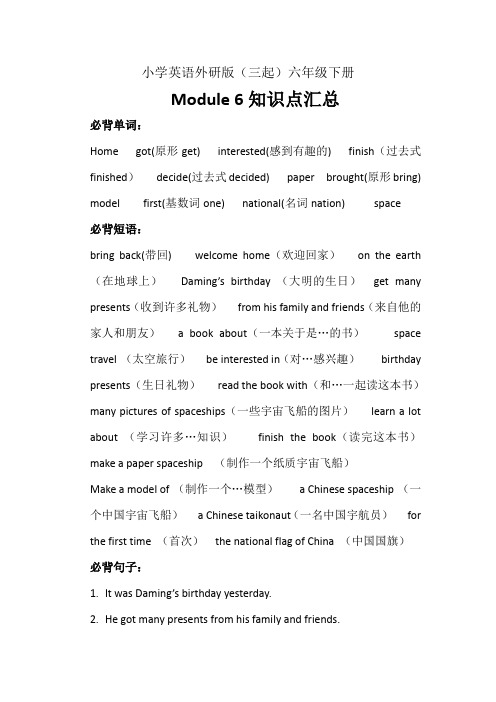
小学英语外研版(三起)六年级下册Module 6知识点汇总必背单词:Home got(原形get) interested(感到有趣的) finish(过去式finished)decide(过去式decided) paper brought(原形bring) model first(基数词one) national(名词nation) space必背短语:bring back(带回) welcome home(欢迎回家)on the earth (在地球上)Daming’s birthday (大明的生日)get many presents(收到许多礼物)from his family and friends(来自他的家人和朋友) a book about(一本关于是…的书)space travel (太空旅行)be interested in(对…感兴趣)birthday presents(生日礼物)read the book with(和…一起读这本书)many pictures of spaceships(一些宇宙飞船的图片)learn a lot about (学习许多…知识)finish the book(读完这本书)make a paper spaceship (制作一个纸质宇宙飞船)Make a model of (制作一个…模型) a Chinese spaceship (一个中国宇宙飞船) a Chinese taikonaut(一名中国宇航员)for the first time (首次)the national flag of China (中国国旗)必背句子:1.It was Daming’s birthday yesterday.2.He got many presents from his family and friends.3.It was a book about space travel.4.Daming is very interested in space travel.5.Daming asked him to read the book with him.6.They learnt a lot about space travel.7.They decided to make a paper spaceship together.8.Daming thanked her for the birthday present.9.In 2003, it took a Chinese taikonaut into space for the first time.10.T he name of the spaceship is Shenzhou Ⅴ.易考点:1.过去式:2. buy +人+物=buy +物+for + 人show +人+物=show +物+to+人ask +人+to +动词原形decide to +动词原形give+人+物= give +物+ to + 人thank+人+for + 物/动词ing 3. in+ 年份。
外研版小学六年级英语的复习计划
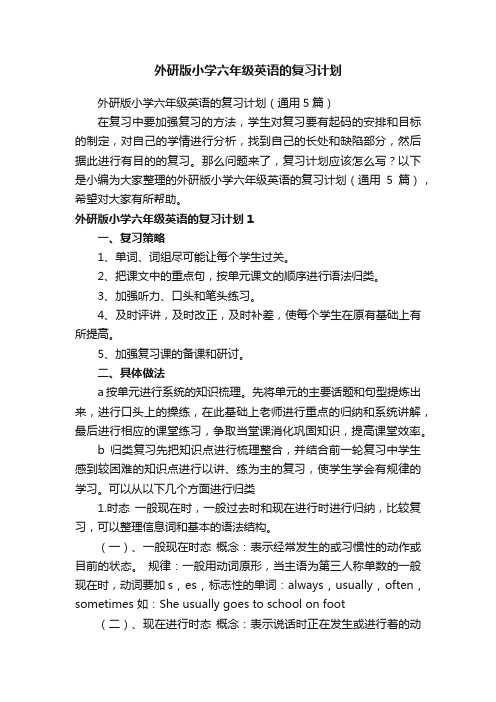
外研版小学六年级英语的复习计划外研版小学六年级英语的复习计划(通用5篇)在复习中要加强复习的方法,学生对复习要有起码的安排和目标的制定,对自己的学情进行分析,找到自己的长处和缺陷部分,然后据此进行有目的的复习。
那么问题来了,复习计划应该怎么写?以下是小编为大家整理的外研版小学六年级英语的复习计划(通用5篇),希望对大家有所帮助。
外研版小学六年级英语的复习计划1一、复习策略1、单词、词组尽可能让每个学生过关。
2、把课文中的重点句,按单元课文的顺序进行语法归类。
3、加强听力、口头和笔头练习。
4、及时评讲,及时改正,及时补差,使每个学生在原有基础上有所提高。
5、加强复习课的备课和研讨。
二、具体做法a按单元进行系统的知识梳理。
先将单元的主要话题和句型提炼出来,进行口头上的操练,在此基础上老师进行重点的归纳和系统讲解,最后进行相应的课堂练习,争取当堂课消化巩固知识,提高课堂效率。
b归类复习先把知识点进行梳理整合,并结合前一轮复习中学生感到较困难的知识点进行以讲、练为主的复习,使学生学会有规律的学习。
可以从以下几个方面进行归类1.时态一般现在时,一般过去时和现在进行时进行归纳,比较复习,可以整理信息词和基本的语法结构。
(一)、一般现在时态概念:表示经常发生的或习惯性的动作或目前的状态。
规律:一般用动词原形,当主语为第三人称单数的一般现在时,动词要加s , es , 标志性的单词:always , usually , often , sometimes 如:She usually goes to school on foot(二)、现在进行时态概念:表示说话时正在发生或进行着的动作。
规律:be + 动词 ing 形式.标志性的单词:look , now , listen 如:Look , the boy is playing football .(三)、一般过去时态概念:表示过去某一时刻或某一时间内发生的动作或情况。
外研版小学六年级下册英语总复习(可编辑修改word版)

Module 1一、单词短语:h amburger 汉堡包cola 可乐juice 果汁dollar 美元cent 美分restaurant 餐厅menu 菜单cashier 收银员careful 小心的Be careful 小心点look 看上去enjoy 享受,享用二、句子句型:1.Can I help you? (店员)我能帮助你吗?2.Can you help me?(客人)你能帮助我吗?3.I (don’t) know.我(不)知道。
4. Here’s (单数) Here’re (复数) 给你…Here you are .给你5.— How much is it?这个多少钱?(一般疑问句)—It’s 数字dollar(s)./ It’s 数字cent(s) 几美元/几美。
6.— What do you want (to eat / drink)?你想要(吃点/喝点)什么?—I want +7.Enjoy your meal! 享受你的大餐吧!8.in all 一共,总共三、单词复习:chicken 鸡肉rice 米饭drink 喝的,饮料noodles 面条meat 肉vegetable 蔬菜tea 茶叶hot dog 热狗cheese 奶酪milk 牛奶fish 鱼,鱼肉Module 2一、单词短语duck 鸭子pond 水池cloud 云picnic 野餐,野炊dry 干的dark 黑的,暗的to go 剩余naughty 调皮的;顽劣的stay 保持,维持later 后来,以后like 想 ..... 一样look like 看起来好像have a picnic 去野餐,吃野餐walk around the lake 绕湖而行go under the tree 去树下面Let’s + V 原型,让我们...... go to the park 去公园go to bed 去睡觉play chess 下象棋look at 看at + 点钟在几点钟二、句子句型:1.What time is it?几点了?It’s整点:数字o’clock(几点整) half past + 数字(几点半)2.going to rain/snow/be windy/ ·····将要下雨/下雪/刮风△将来时:3.be going to = will 计划和将要发生事be: am are is我是 am 你是are, is 连着他她它,两个以上都用are例如:.问:When are we going to go eat(动原)? 我们什么时候去吃东西?答:We are going to eat at half past twelve. 我们将在十二点半吃。
- 1、下载文档前请自行甄别文档内容的完整性,平台不提供额外的编辑、内容补充、找答案等附加服务。
- 2、"仅部分预览"的文档,不可在线预览部分如存在完整性等问题,可反馈申请退款(可完整预览的文档不适用该条件!)。
- 3、如文档侵犯您的权益,请联系客服反馈,我们会尽快为您处理(人工客服工作时间:9:00-18:30)。
小学英语总复习(一)------名词名词有可数名词和不可数名词之分。
可数名词可用数字来计算,有单、复数形式,不可数名词不能用数字来计算,没有复数形式。
一、可数名词单数变复数规则1.一般情况,直接在名词后加-s,如:book-books, bag-bags, cat-cats, foot-foots2.以s. x. sh. ch结尾的词,在词尾加-es,如:bus-buses, box-boxes, watch-watches3.以“辅音字母+y”结尾得词,变y为i, 再加-es,如:family-families, baby-babies4.以“f或fe”结尾,变f或fe为v, 再加-es,如:knife-knives,wife-wives5.不规则名词复数:man-men, woman-women, policeman-policemen, policewoman-policewomen, mouse-mice,child-children, foot-feet, tooth-teeth, fish-fish, sheep-sheep people-people, Chinese-Chinese, Japanese-Japanese写出下列各词的复数I _______ him _______ this _______ her ______ watch ______child ______thatphoto day_______sandwich________ boy_______dress ________tooth_______ sheep______box_______man______woman_______toy family小学英语总复习(二)------介词下面就时间概念的介词用法做一简要介绍和比较。
1.at(1)表示时间概念的某一个点。
(在具体的某一时刻和时段等)。
at night at 6:00(2)表示在某一具体地点(小地点)。
如at the bus stop ,at home2.on(1) 在······上面(表面接触;长在上面)。
如on the chair,on the tree(2)在某天的上午、下午或晚上。
如:on Monday ,on Tueday moring3.in(1)在······里面。
如:in the box(2)在一段时间里。
如:in the moring(3)在某一年份、季节、月份。
如:in 2014,in October,in summer(4)在······上(外来)如:There is a cat in the tree.4.after(1)在······之后(时间)。
如:I often play football school .(2)在······后面(位置)。
如:I can run after you .口诀(时间介词)年月周前要用in,日子前面却不行。
遇到几号要用on,上午下午又是in。
要说某日上下午,用on换in才能行。
午夜黄昏须用at,黎明用它也不错。
at也用在时分前,说“差”可要用上to,说“过”只可使用past,多说多练牢牢记,莫让岁月空蹉跎。
口诀(方位介词)in在······里,out在······外,在旁边的是beside,靠近的为by, on在······上,under 在·······下,over在······上头,below在底下。
词语练习一、介词填空1、_______ the school playground2、_________ Wednesday3、a lot _______ fruit trees4、live _________ a town5、look ______ them 7、________ New Year6、_________ Christmas Day小学英语总复习(三)------代词一、人称代词和物主代词1、人称代词有主格和宾格的区别:主格通常位于句中第一个动词之前,宾格一般位于动词或介词之后。
2、物主代词有形容词性与名词性的区别:形容词性用时后面一般要带上词,名词性则单独使用,后面不带名词。
二、指示代词共有四个:this,that,these,those。
this 和that 用于指代单数,these和those用于指代复数。
三、疑问代词一般用来构成特殊疑问句,常见的疑问代词有who(谁),when什么时候),where(哪里),what(什么),how (怎样),which(哪一个)等等。
练习一.填写代词表二.用所给词的适当形式填空1. That is not _________ kite. That kite is very small, but _________ is very big. ( I )2. The dress is _________. Give it to _________. ( she )3. Is this _________ watch? (you) No, it’s not _________ . ( I )4. _________ is my brother. _________ name is Jack. Look! Those stamps are _________. ( he )5. _________ dresses are red. (we) What colour are _________? ( you )6. Here are many dolls, which one is _________ ? ( she )7. I have a beautiful cat. _________name is Mimi. These cakes are _________. ( it )10. Are these _________ tickets? No, _________ are not _________. _________ aren’t here. ( they )12. I have a lovely brother. _________ is only 3. I like _________ very much. ( he )13. _________ is my aunt. Do you know _________ job? _________ a nurse. ( she )14. So many dogs. Let’s count _________. ( th ey )三、用am, is, are 填空1. I ______ a boy. ______ you a boy? No, I _____ not.2. The girl______ Jack's sister.3. The dog _______ tall and fat.4. The man with big eyes _______ a teacher.5. You, he and I ______ from China.6. Where _____ your mother? She ______ at home.7. Mike and Liu Tao ______ at school.8. Whose dress ______ this?9. Whose socks ______ they?10. That ______ my red skirt.小学英语总复习(四)------形容词小学英语总复习(五)------一般现在时(一)一般现在时的基本用法;1.表示经常的或习惯性的动作,常与表示频率的时间状语连用,(alway, usually, sometime, never, every day,every week,······如:I get up at six every day.我每天六点起床。
2.表示客观现实和普遍的真理。
如:The earth moves around the sun.地球绕着太阳转。
3.表示主语的特征、能力、职业、性格。
如:The sky is blue.天空是蓝色的。
My mother is a teacher .我妈妈是位老师。
(二)一般现在时的构成:1. be动词:①肯定句:主语+be(am, is, are)+其它。
如:I am a boy. 我是一个男孩。
②否定句:主语+ be + not +其它。
如:He is not a worker.他不是工人。
③一般疑问句:Be +主语+其它。
如:-Are you a student? -Yes. I am. / No, I'm not.2. 行为动词:①肯定句:主语+行为动词(+其它)。
如:We study English. 我们学习英语。
(当主语为第三人称单数(he, she, it)时,要在动词后加"-s"或"-es"。
如:Mary likes Chinese.玛丽喜欢汉语)②否定句:主语+ don't( doesn't ) +动词原形(+其它)。
如:I don't like bread.(当主语为第三人称单数时,要用doesn't构成否定句。
如:He doesn't often play.)③一般疑问句:Do( Does ) +主语+动词原形+其它。
如:- Do you often play football? - Yes, I do. / No, I don't.。
(三)一般现在时动词第三人称单数形式变化规则:1.一般情况下,直接加-s,如:look-looks, play--plays2.以s. x. sh. ch. o结尾,加-es,如:wash-washes, watch-watches, go-goes3.以“辅音字母+y”结尾,变y为i, 再加-es,如:study-studies,fly--flies另外,还有一些特殊情况,需熟记。
